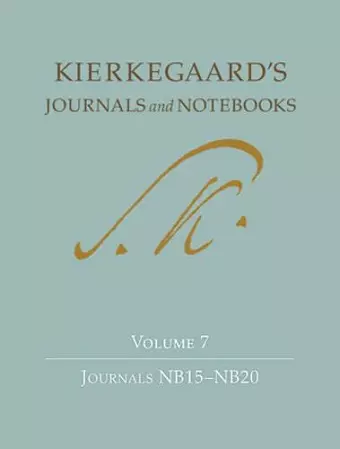Kierkegaard's Journals and Notebooks, Volume 7
Journals NB15-NB20
Søren Kierkegaard author Alastair Hannay editor George Pattison editor Bruce H Kirmmse editor Niels Jørgen Cappelørn editor K Brian Söderquist editor Vanessa Rumble editor
Format:Hardback
Publisher:Princeton University Press
Published:28th Oct '14
Currently unavailable, our supplier has not provided us a restock date

For over a century, the Danish thinker Soren Kierkegaard (1813-55) has been at the center of a number of important discussions, concerning not only philosophy and theology, but also, more recently, fields such as social thought, psychology, and contemporary aesthetics, especially literary theory. Despite his relatively short life, Kierkegaard was an extraordinarily prolific writer, as attested to by the 26-volume Princeton University Press edition of all of his published writings. But Kierkegaard left behind nearly as much unpublished writing, most of which consists of what are called his "journals and notebooks." Kierkegaard has long been recognized as one of history's great journal keepers, but only rather small portions of his journals and notebooks are what we usually understand by the term "diaries." By far the greater part of Kierkegaard's journals and notebooks consists of reflections on a myriad of subjects--philosophical, religious, political, personal. Studying his journals and notebooks takes us into his workshop, where we can see his entire universe of thought. We can witness the genesis of his published works, to be sure--but we can also see whole galaxies of concepts, new insights, and fragments, large and small, of partially (or almost entirely) completed but unpublished works. Kierkegaard's Journals and Notebooks enables us to see the thinker in dialogue with his times and with himself. Volume 7 of this 11-volume series includes six of Kierkegaard's important "NB" journals (Journals NB15 through NB20), covering the months from early January 1850 to mid-September of that year. By this time it had become clear that popular sovereignty, ushered in by the revolution of 1848 and ratified by the Danish constitution of 1849, had come to stay, and Kierkegaard now intensified his criticism of the notion that everything, even matters involving the human soul, could be decided by "balloting." He also continued to direct his barbs at the established Danish Church and its clergy (particularly Bishop J. P. Mynster and Professor H. L. Martensen), at the press, and at the attempt by modern philosophy to comprehend the incomprehensibility of faith. Kierkegaard's reading notes include entries on Augustine, the Stoics, German mystics, Luther, pietist authors, and Rousseau, while his autobiographical reflections circle around the question of which, if any, of several essays explaining his life and works he ought...
"For all of his lyricism, many of Kierkegaard's works project themselves as an impenetrable fortress of abstractions. These magnificently translated journals are a tunnel beneath the moat of that fortress. They capture the unpackaged and unbuttoned Kierkegaard and thus provide a stimulus to anyone intent on understanding a religious author who could well be reckoned a Luther of Lutheranism."--Gordon Marino, Christian Century "These new critical editions do an excellent job of making Kierkegaard's journals and notebooks available in all their richness."--Brian Gregor, Elizabeth C. Shaw and Staff
ISBN: 9780691160290
Dimensions: unknown
Weight: 1673g
832 pages